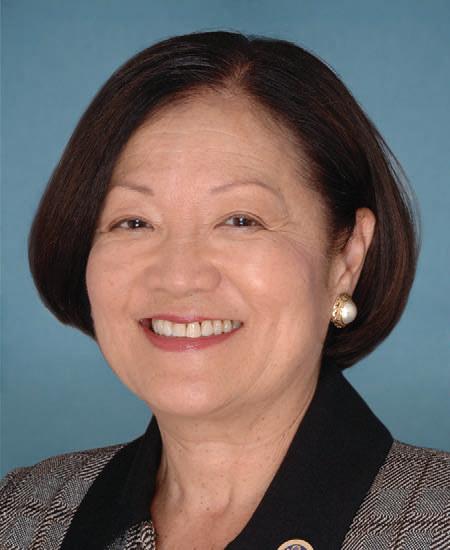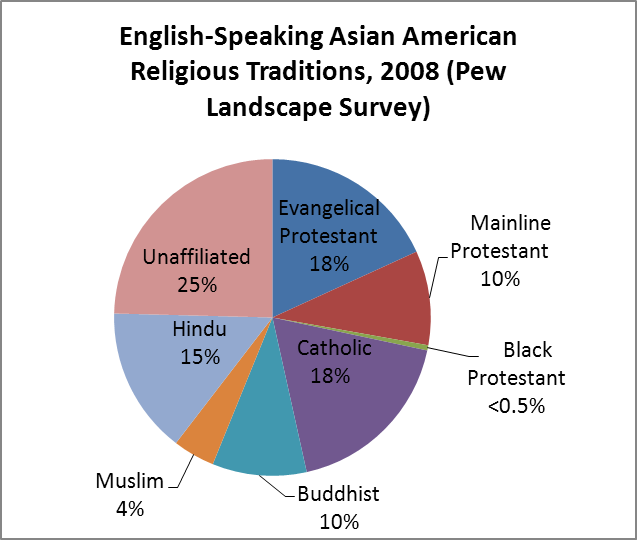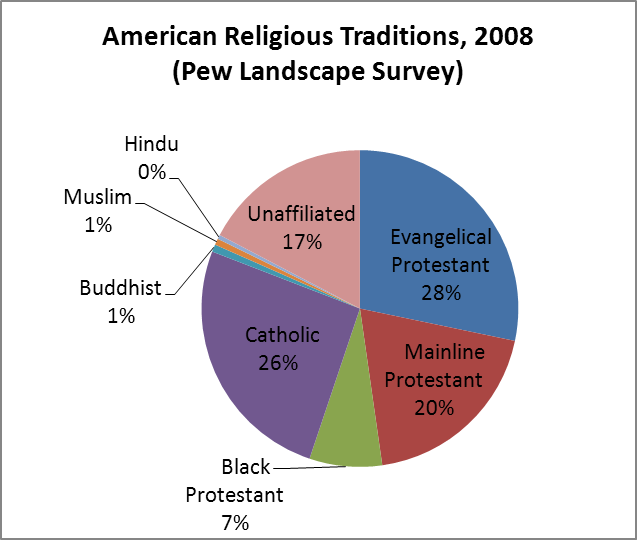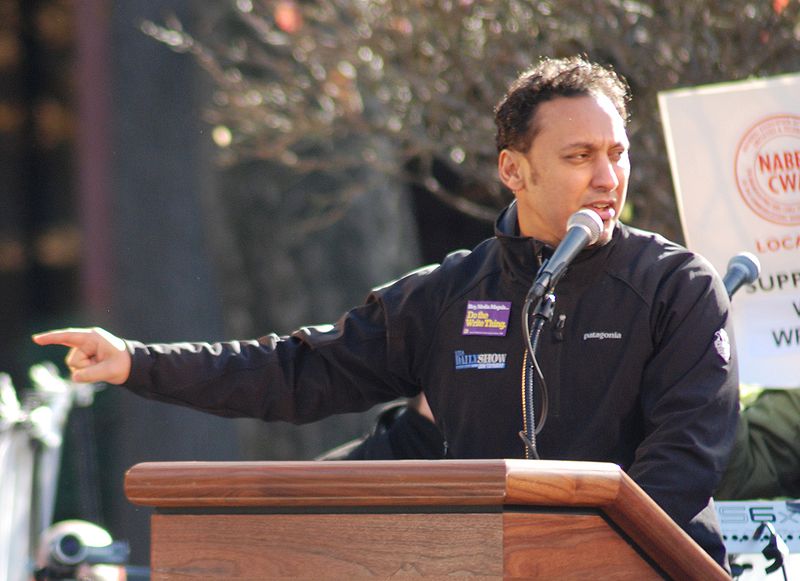In earlier posts I’ve shown how difficult it is to get a good survey of religion among Asian Americans, and I’ve shown what we sort of know about the actual religious prevalence of this racial group. The one group I have neglected to mention are the religiously-affiliated non-Christians. In the following pie charts I illustrate data using the Pew Religious Landscape Survey 2008 of the estimated distribution of major world religions for the entire sample and within the Asian American sample. As you recall this was only translated into Spanish so, the Asian American findings pertain to those who are comfortable answering a survey over the phone in English.
The largest three non-Christian traditions among English-preferred Asian Americans are Buddhism, Hinduism and Islam, and they take up 10, 15 and 4% respectively of all Asian Americans in the sample. This may not seem like much but consider the comparison to the overall sample where Buddhism, Hinduism and Islam combined account for less than 3%.
Another way of saying this is that major non-Christian religions are over-represented among Asian Americans. In gross numbers that around 5 million people. Keep in mind this estimate is based on a sample with no Asian-language translation, so this is a low estimate. In my opinion, if we want to understand the social and political (as well as religious) views of our non-Christian friends, neighbors and co-workers, we should survey Asian Americans.
Since 9/11 attention to our religious diversity and our tolerance of religious difference has been at an all-time high. From my limited purview of American history, we’ve not had a great track record at respecting our religious differences. It’s true, the magnitude of violence against religious minorities whether Catholic, Jewish, Mormon, Native American has not been as severe compared to the religious wars in Europe, but the issue is one of ideals: as a nation we actually were founded in part on religious tolerance, so if there’s one characteristic that should stand out as particularly American, it should be that. My hometown of Philadelphia was particularly known for advocating this idea. Nevertheless what we know is the following: anti-Catholic sentiment persisted right until Kennedy (and some would say continues so with the unbalanced attention given to the sexual misbehavior among Catholic clergy compared to Protestant clergy). Anti-Semitism remains the highest reported religious hate crime according to the FBI’s hate crime report (each report shows this as far back as 2002 in a quick look). And implicitly, with the exclusion of the Chinese and all Asian immigrants from the 1880s through the 1960s anti-Buddhist, anti-Hindu and anti-Muslim sentiment was implied. And most important, anti-Muslim sentiment has continued unabated since 2001.
Since this blog is largely aimed at a Christian audience, my question is this: what are our responsibilities toward our religious non-Christian friends and neighbors and co-workers? For some, I would guess that religious tolerance is one of the hallmark characteristics of a good American Christian. Just as we want our freedom to express our faith, so we wish that others would share in that freedom. In that way, being Christian and upholding the ideal of American religious tolerance go hand in hand. Such believers tend to say that Christianity is not the only religion containing ultimate truth. Other Christians might see this view at odds with their understanding of Christianity. Tolerance sure, but at the end of the day, Christianity (particularly their version of it) has the exclusive hold on ultimate truth. Sociologist Robert Wuthnow describes these two perspectives as “religious inclusivism” and “religious exclusivism” in his study on Americans’ views on religious diversity.
He found that Christians generally are quite supportive of religious diversity but the support seems to be rather thin. While religiously inclusive Americans tend to be more supportive of religious diversity, very few of these folks actually know all that much about Buddhism, Hinduism, or Islam. On top of that, they tend not to know anyone who follows these religions. Religious exclusivists may believe that their religion is the one that gets them to heaven, but apparently they too do little to actually try and “win” over their non-Christian co-workers and teammates. Apparently a culture of tolerance dampens their zeal. Indeed his chapter on interreligious marriages suggests that the main solution for respecting one another’s religious differences is to not talk about it at all.

What do Chinese Christians and Buddhists think of one another? What do Indian American Christians, Hindus and Muslims think of one another? Do they have meaningful relationships with each other while still holding to their faith? Does their ethnic minority status trump their religious differences in their identity?
On a prescriptive note, in a nation that prides itself on religious tolerance, it seems unfortunate that we choose to disengage one another. It’s great that we’re so tolerant but surely we can do better than just advocate for religious tolerance. Could we not learn from one another by having a dinner conversation or catching a game on a Saturday or Sunday afternoon?



















